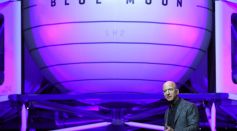Tags: NASA
Does NASA Really Need to Deep Clean Mars Spacecrafts? Scientists Say 'No!'
NASA Astronauts No Longer Flying in Boeing's Starliner as They Were Reassigned to a SpaceX Flight
SpaceX Dragon Capsule Returns From ISS, Splashdown Causes Sonic Boom in Florida

SpaceX Crew 3 Mission: 5th Crewed Flight Prepares For Quick Halloween Launch To ISS Carrying Equipment for Human, Rodent Research
NASA Lucy Spacecraft Set to Explore Jupiter Trojan Asteroids Soon; Can Netizens Help?

NASA's Deep Space Atomic Clock Study Completed; Navigation on Space Missions Will Get Better Soon
Russia Soyuz Rocket Will Beat NASA, Tom Cruise As It Will Soon Launch First Film Crew to Space; Who Will Be Aboard?
Astrovan Needs New Design for Artemis Mission, and NASA is Open for Suggestions
Low-Cost Mars Exploration Being Developed, Novel Ways to Gather More Data on the Red Planet May Be Possible Soon
NASA Hubble Space Telescope Meets a Highly Energetic Galaxy; How Hyper Can This Be?
NASA Hubble Space Telescope: Find Out What Did It Capture In Space On Your Birthday
SpaceX Dragon Cargo: Lights Up the Night Skies and Sonic Booms Over Florida as it Descents Back to Earth

NASA Rejects Petition to Rename James Webb Space Telescope; Discrimination Claims Not Enough?

NASA Hits Back at Blue Origin: Jeff Bezos "Prioritizes Own Fortune Over Every Person Alive Today," Files Case After Elon Musk's SpaceX Wins Bid
Mars Might Not Have Enough Water to Support Life; Here's What It Means
NASA's Lucy Space Vessel Set to Obtain New Astronomical Records in Trojan Asteroid Investigation Near Jupiter
Can NASA James Webb Space Telescope's Atmosphere Detection Feature Find Life? Here's What Experts Say

Elon Musk Tells Jeff Bezos That Blue Origin's Legal Fight with NASA Won't Guarantee Its Way To Moon
NASA Mars Missions Will Be Quiet For 2 Weeks to Protect Spacecraft From Solar Conjunction 2021
NASA's Lucy Mission Going to Space Soon to Probe Jupiter’s Weird Trojan Asteroids
Most Popular

Starlink Satellite Explodes in Orbit; SpaceX Confirms It'll Re-Enter Earth

Aurora Phenomenon: How Geomagnetic Storms and Space Weather Are Lighting Up the World

Ocean Warming Explained: Why Climate Science Shows Sea Temperature Rise Is Speeding Up

How Wildfires Start, Spread, and Ignite: Understanding the Causes and Fire Behavior Clearly





